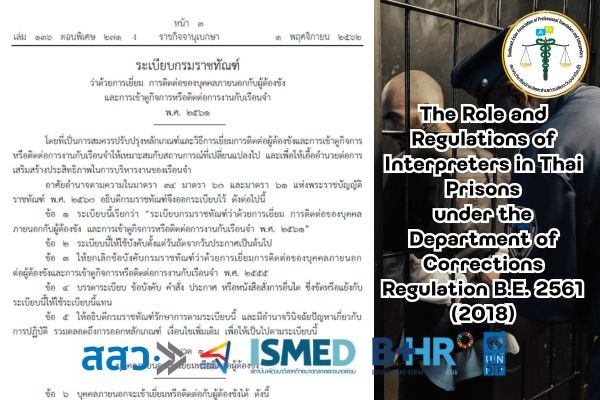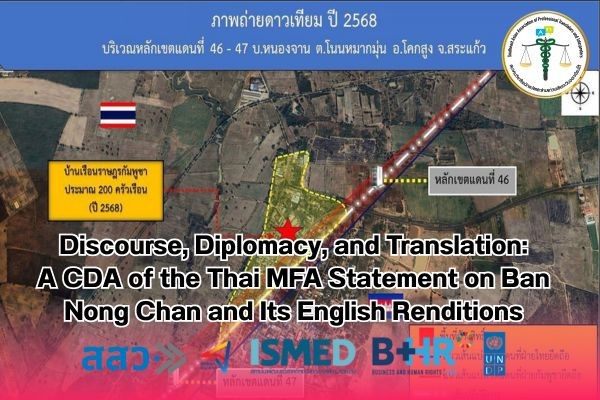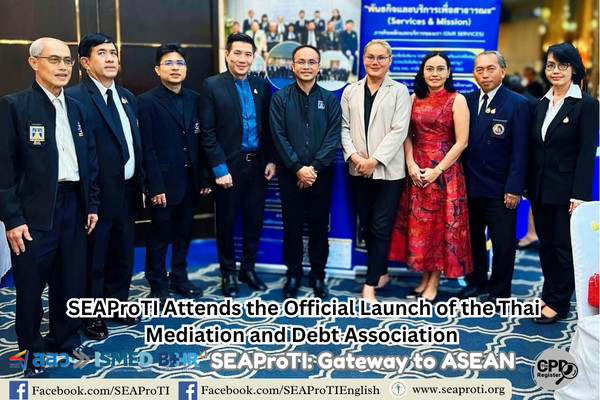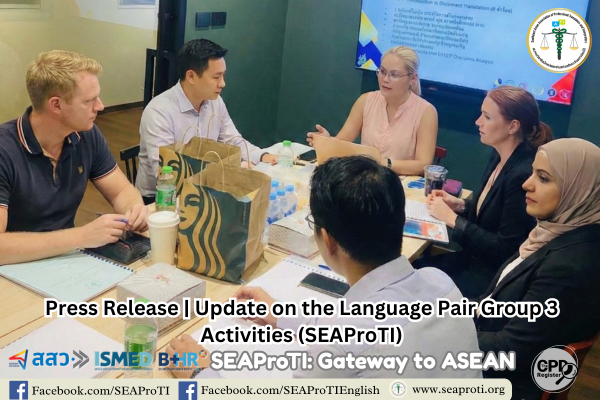The Role and Regulations of Interpreters in Thai Prisons
under the Department of Corrections Regulation B.E. 2561 (2018)
By Wanitcha Sumanat (12 May 2025)
Effective communication in judicial proceedings is a fundamental right of prisoners, especially for those unable to communicate in Thai or who face communication barriers. It is necessary to provide interpreters to ensure fairness and uphold human rights. This article explores the provisions regarding the use of interpreters in Thai prisons under the Department of Corrections Regulation B.E. 2561 (2018), which stipulates the roles, duties, and limits of interpreters to protect inmates’ rights and maintain prison security.
1. Introduction
Prisons inherently limit individual freedoms, but the human rights of prisoners must still be upheld according to international standards, such as the United Nations Standard Minimum Rules for the Treatment of Prisoners (The Nelson Mandela Rules). These rules affirm that prisoners must be given proper communication support to defend their legal interests.
In Thailand, the Department of Corrections Regulation on the Visiting and Contact of Prisoners by Outsiders B.E. 2561 (2018) officially specifies the provisions for the use of interpreters.
2. Provisions on the Use of Interpreters in Thai Prisons
2.1 Conditions for Interpreter Access
According to Article 13 of the Regulation, a lawyer requesting to meet a prisoner for legal purposes may request permission to bring an interpreter if the prisoner:
- Is a foreign national
- Is a Thai national who uses a regional dialect, or cannot speak/understand Thai
- Has significant speech, hearing, or communication impairments
2.2 Documentation Requirements
Interpreters must present valid identification:
- National ID card
- Or ga overnment-issued ID with a photo
- Or passport
- The request must be submitted to the prison commander or an authorized delegate.
2.3 Authority and Oversight
The prison commander has the discretion to approve or deny the request. If an interpreter provides false information or violates regulations, the prison authorities may:
- Record the violation for documentation
- Immediately remove the interpreter from the premises
- Prohibit the interpreter from further access to that prison
2.4 Limitations and Responsibilities of Interpreters
Interpreters must comply with Article 9 of the Regulation, including:
- Remaining only in designated areas
- Not delivering or receiving items from prisoners
- Not facilitating or promoting any illegal activities
- Using Thai or another authorized language
- Agreeing to monitoring by prison officials, including audio or video recordings, and accepting communication termination if deemed necessary
3. The Specific Role of Interpreters in Thai Prisons
The role of interpreters under the Regulation is strictly limited to assisting lawyers in meetings with prisoners for legal matters. Family members or general visitors are not permitted to bring interpreters for visits.
4. Observations and Recommendations
The Regulation does not specify professional standards or certification requirements for interpreters. It is recommended that clear guidelines be established to mitigate risks and enhance transparency.
Suggestions include:
- Specialized interpreter training for prison contexts
- Setting minimum qualification standards in line with professional benchmarks
- Establishing an accredited list of certified interpreters by the Department of Corrections, or other reputable agencies,s or professional associations
5. Conclusion
The provisions for interpreter use in Thai prisons under the Department of Corrections Regulation B.E. 2561 (2018) serve as a vital safeguard for prisoner rights and institutional security. However, further improvements should be made to include qualification and training standards to ensure the fairness and effectiveness of legal proceedings involving prisoners.
References
- Department of Corrections. (2019). Regulation of the Department of Corrections on Visiting, Contacting of Prisoners by Outsiders, and Inspection or Work Contact with Prisons, B.E. 2561 (2018). Royal Thai Government Gazette, Vol. 136, Special Part 271 Ngor.
- United Nations. (2015). The Nelson Mandela Rules (Standard Minimum Rules for the Treatment of Prisoners).
- Published in the Royal Gazette: Regulation of the Department of Corrections on Visitations, Communications between External Persons and Inmates, and Access to Prison Activities or Operations B.E. 2561 (2018) (Read more here)
SEAProTI’s certified translators, translation certification providers, and certified interpreters:
The Southeast Asian Association of Professional Translators and Interpreters (SEAProTI) has officially announced the criteria and qualifications for individuals to register as “Certified Translators,” “Translation Certification Providers,” and “Certified Interpreters” under the association’s regulations. These guidelines are detailed in Sections 9 and 10 of the Royal Thai Government Gazette, issued by the Secretariat of the Cabinet under the Office of the Prime Minister of the Kingdom of Thailand, dated July 25, 2024, Volume 141, Part 66 Ng, Page 100.
To read the full publication, visit: the Royal Thai Government Gazette
บทบาทและข้อกำหนดเกี่ยวกับการใช้ล่ามในเรือนจำไทยตามระเบียบกรมราชทัณฑ์ พ.ศ. 2561
โดย วณิชชา สุมานัส (12 พฤษภาคม 2568)
การสื่อสารที่มีประสิทธิภาพในกระบวนการยุติธรรมถือเป็นสิทธิขั้นพื้นฐานของผู้ต้องขัง โดยเฉพาะในกรณีที่ผู้ต้องขังไม่สามารถสื่อสารเป็นภาษาไทยได้ หรือมีข้อจำกัดในการสื่อสาร จำเป็นต้องมีการจัดให้มีล่ามเพื่ออำนวยความสะดวกตามหลักสิทธิมนุษยชนและความเป็นธรรมทางกฎหมาย บทความนี้ศึกษาข้อกำหนดเกี่ยวกับการใช้ล่ามในเรือนจำของประเทศไทยตามระเบียบกรมราชทัณฑ์ พ.ศ. 2561 ซึ่งกำหนดบทบาท หน้าที่ และขอบเขตการใช้ล่ามอย่างชัดเจน เพื่อรักษาสิทธิผู้ต้องขังและคุ้มครองความมั่นคงของเรือนจำ
1. บทนำ
เรือนจำเป็นสถานที่ที่จำกัดเสรีภาพของบุคคล แต่ยังคงต้องยึดหลักสิทธิมนุษยชนตามมาตรฐานสากล เช่น ข้อกำหนดขั้นต่ำของสหประชาชาติว่าด้วยการปฏิบัติต่อผู้ต้องขัง (UN Standard Minimum Rules for the Treatment of Prisoners: The Nelson Mandela Rules) ซึ่งยืนยันว่าผู้ต้องขังต้องได้รับโอกาสในการสื่อสารอย่างเหมาะสมเพื่อประโยชน์ในการดำเนินคดีของตนเอง
ในบริบทของประเทศไทย ระเบียบกรมราชทัณฑ์ว่าด้วยการเยี่ยมและการติดต่อของบุคคลภายนอกกับผู้ต้องขัง พ.ศ. 2561 ได้บัญญัติหลักเกณฑ์การใช้ล่ามไว้อย่างเป็นทางการ
2. ข้อกำหนดเกี่ยวกับการใช้ล่ามในเรือนจำไทย
2.1 หลักเกณฑ์ในการขออนุญาต
ตามข้อ 13 ของระเบียบฯ ทนายความที่ยื่นคำร้องขอเข้าพบผู้ต้องขังเพื่อวัตถุประสงค์ทางคดี สามารถขออนุญาตนำล่ามเข้าร่วมได้ในกรณีที่ผู้ต้องขังมีคุณสมบัติข้อใดข้อหนึ่งดังนี้
- เป็นชาวต่างประเทศ
- เป็นชาวไทยที่ใช้ภาษาท้องถิ่นหรือไม่สามารถพูดหรือเข้าใจภาษาไทย
- มีปัญหาในการพูด การได้ยิน หรือการสื่อสารอย่างมีนัยสำคัญ
2.2 เอกสารประกอบการขออนุญาต
ล่ามต้องแสดงเอกสารยืนยันตัวตน ได้แก่
- บัตรประจำตัวประชาชน
- หรือบัตรราชการที่มีรูปถ่าย
- หรือหนังสือเดินทาง
- โดยคำร้องต้องยื่นต่อผู้บัญชาการเรือนจำหรือผู้ได้รับมอบหมาย
2.3 อำนาจและการควบคุมของเรือนจำ
ผู้บัญชาการเรือนจำเป็นผู้มีอำนาจอนุญาตหรือปฏิเสธการเข้าพบ หากพบว่าล่ามให้ข้อมูลเท็จหรือกระทำการขัดระเบียบ สามารถดำเนินการดังต่อไปนี้
- บันทึกการกระทำผิดไว้เป็นหลักฐาน
- เชิญออกจากบริเวณเรือนจำทันที
- ห้ามกลับเข้ามาในฐานะล่ามในเรือนจำนั้นอีกต่อไป
2.4 ข้อจำกัดและหน้าที่ของล่าม
ล่ามต้องปฏิบัติตามข้อกำหนดในข้อ 9 หมวด 1 ได้แก่
- อยู่เฉพาะในพื้นที่ที่กำหนด
- ห้ามส่งหรือรับสิ่งของแก่ผู้ต้องขัง
- ห้ามเป็นสื่อกลางในการกระทำผิดกฎหมายหรือระเบียบราชทัณฑ์
- ใช้ภาษาไทยหรือภาษาต่างประเทศตามที่ได้รับอนุญาต
- ยินยอมให้เจ้าหน้าที่เรือนจำฟังการสนทนา บันทึกภาพหรือเสียง และตัดการสื่อสารได้ในกรณีจำเป็น
3. บทบาทเฉพาะของล่ามในเรือนจำไทย
บทบาทของล่ามภายใต้ระเบียบกรมราชทัณฑ์ไทยจำกัดไว้เฉพาะในบริบทของการช่วยเหลือด้านกฎหมายในการพบผู้ต้องขังร่วมกับทนายความ เพื่อให้การดำเนินคดีเป็นไปอย่างเป็นธรรม ญาติหรือบุคคลทั่วไปไม่มีสิทธิ์นำล่ามเข้าเยี่ยมผู้ต้องขังด้วยตนเอง
4. ข้อสังเกตและข้อเสนอแนะ
แม้ระเบียบจะไม่ได้กำหนดรายละเอียดเกี่ยวกับมาตรฐานคุณสมบัติหรือการรับรองวิชาชีพของล่าม แต่ในทางปฏิบัติควรมีการกำหนดแนวทางการคัดเลือกและจรรยาบรรณของล่ามให้ชัดเจนเพื่อป้องกันความเสี่ยงและเพิ่มความโปร่งใส
ข้อเสนอแนะ ได้แก่
- การฝึกอบรมล่ามสำหรับงานในเรือนจำโดยเฉพาะ
- การกำหนดคุณสมบัติขั้นต่ำของล่ามตามมาตรฐานวิชาชีพ
- การมีบัญชีรายชื่อล่ามที่ผ่านการรับรองของกรมราชทัณฑ์ หรือหน่วยงาน หรือสมาคมวิชาชีพที่น่าเชื่อถือ
5. บทสรุป
การกำหนดข้อบังคับเกี่ยวกับการใช้ล่ามในเรือนจำไทยภายใต้ระเบียบกรมราชทัณฑ์ พ.ศ. 2561 เป็นมาตรการสำคัญในการคุ้มครองสิทธิของผู้ต้องขังและรักษาความมั่นคงของเรือนจำ อย่างไรก็ตาม ในอนาคตควรมีการปรับปรุงรายละเอียดเกี่ยวกับคุณสมบัติและการฝึกอบรมของล่ามเพื่อเพิ่มประสิทธิภาพและความเป็นธรรมในกระบวนการยุติธรรม
เอกสารอ้างอิง
- กรมราชทัณฑ์. (2562). ระเบียบกรมราชทัณฑ์ว่าด้วยการเยี่ยม การติดต่อของบุคคลภายนอกกับผู้ต้องขัง และการเข้าดูกิจการหรือติดต่อการงานกับเรือนจำ พ.ศ. 2561. ราชกิจจานุเบกษา เล่ม 136 ตอนพิเศษ 271 ง.
- United Nations. (2015). The Nelson Mandela Rules (Standard Minimum Rules for the Treatment of Prisoners).
- ประกาศในราชกิจจานุเบกษา: ระเบียบกรมราชทัณฑ์ว่าด้วยการเยี่ยม การติดต่อของบุคคลภายนอกกับผู้ต้องขัง และการเข้าดูกิจการหรือติดต่อการงานกับเรือนจำ พ.ศ. 2561 (อ่านเพิ่มเติมที่นี่)
เกี่ยวกับนักแปลรับรอง ผู้รับรองการแปล และล่ามรับรองของสมาคมวิชาชีพนักแปลและล่ามแห่งเอเชียตะวันออกเฉียงใต้
สมาคมวิชาชีพนักแปลและล่ามแห่งเอเชียตะวันออกเฉียงใต้ (SEAProTI) ได้ประกาศหลักเกณฑ์และคุณสมบัติผู้ที่ขึ้นทะเบียนเป็น “นักแปลรับรอง (Certified Translators) และผู้รับรองการแปล (Translation Certification Providers) และล่ามรับรอง (Certified Interpreters)” ของสมาคม หมวดที่ 9 และหมวดที่ 10 ในราชกิจจานุเบกษา ของสำนักเลขาธิการคณะรัฐมนตรี ในสำนักนายกรัฐมนตรี แห่งราชอาณาจักรไทย ลงวันที่ 25 ก.ค. 2567 เล่มที่ 141 ตอนที่ 66 ง หน้า 100 อ่านฉบับเต็มได้ที่: นักแปลรับรอง ผู้รับรองการแปล และล่ามรับรอง

























